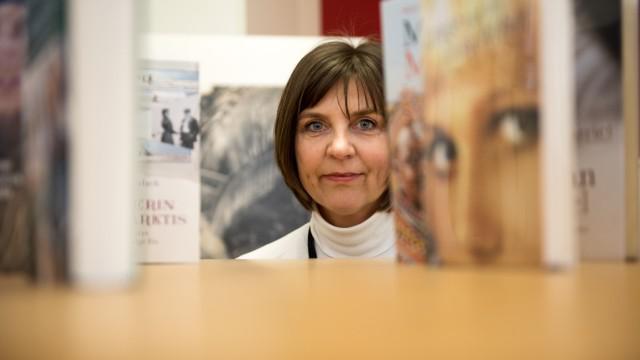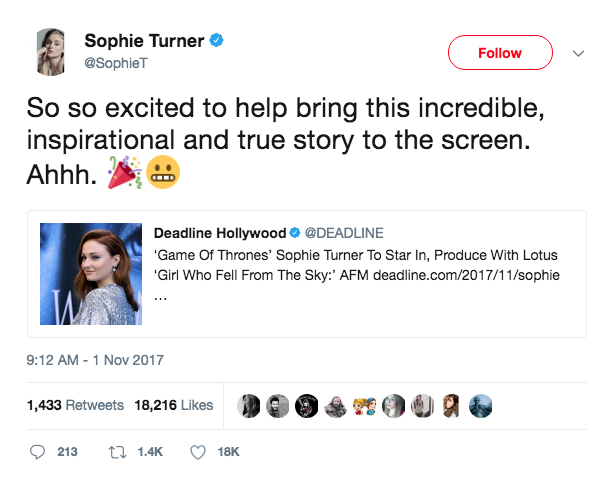
Why international film companies are interested in the stories of a Munich literary agent.
(Picture: Catherina Hess)
Very few German books make it to the big screen in America. Christine Proske was successful in this endeavor: With the story of a young woman who was the sole survivor of a plane crash.
Interview by Gerhard Fischer Süddeutsche Zeitung, 9.1.2018
Translated by Brigid Wefelnberg
Christine Proske is a literary agent. She has produced books with Liselotte, with Iris Berben and with many other strong women. Proske, 55, has now sold a bestseller to Hollywood: the story of a girl who survived a fall of approx. 3,000 meters.
SZ: You sold the movie rights of the book "When I Fell from the Sky" to Hollywood…
Christine Proske: …which is a great success, as very few German books have managed to be made into movies in Hollywood to date.
"When I Fell from the Sky" tells the story of a 17-year-old German woman who was the sole survivor of a plane crash which occurred on December 24, 1971. She was rescued eleven days later in the Peruvian jungle.
Juliane Koepcke was with her mother on a flight from Lima to Pucallpa, located in the east of Peru. Her parents, who were both biologists, led a research station in the rainforest there. The plane crashed.
Why?
The plane was struck by lightning during a heavy thunderstorm.
Juliane Koepcke plummeted from 3000 meters - and survived.
She was hurled out of the plane with her seat, but the seat belt had held. One of the theories of why she survived is that the seat functioned as a sort of propeller or parachute and broke fall as did the trees of the jungle.
How severe were here injuries?
When she woke up on the ground, she was lying under her seat. She had two flesh wounds, a broken collarbone and had lost her glasses and a shoe. And she then started walking. As a child, her parents had taught her that you should look for and follow streams or rivers in the jungle. That was the surest way to eventually reach an inhabited area.
But she first came across parts of the plane.
Yes, after a few days, Juliane Koepcke did actually discover wreckage of the plane.
Did she also see dead bodies? Her mother, who had sat next to her on the plane, did not survive the crash.
No, only wreckage. She then continued on to search for a watercourse. She could hear the search planes in the sky which had been sent out after the crash. But of course, they could not spot this one little person in the jungle from that height.
What did she live off of the whole time?
She didn’t eat anything. Her parents had taught her that you should not eat in the jungle because you never know what is poisonous or not. Juliane Koepcke only had a few candies with her. She drank water from the river. For eleven whole days and without any food whatsoever, she hiked or drifted in the river.
Was not that very dangerous?
The parents had taught her: The local caimans don’t actually attack humans, and if they do, they only do so when they are on the shore.
How was she finally found?
After eleven days, she found a shelter where she lay down and was eventually discovered by three lumberjacks.
What called your attention to the story as an agent?
Juliane Diller, as she is called today, appeared in a talk show with Markus Lanz in 2009. I saw the talk show and thought this story must be made into a book. I met Ms. Diller and am very happy that I convinced her to work with me.
Did you have to do some convincing?
Yes, Ms. Diller is a very humble person and did not want a hype around her person. She became an instant celebrity in Peru after being found in the jungle in 1971. Reporters followed her every move. Due to the intense media attention, her father even sent her back to Germany to get her out of the public eye.
The book was published in Germany in 2011 and immediately landed on the Spiegel bestseller list.
It was number one for several weeks. Mrs. Diller wrote it together with Beate Rygiert, and it was published in Germany and in nine other countries: in England and the USA, just to mention a couple.
How did your contacts to Hollywood come to being?
I had noticed for some time that there was an increased focus on the “True Stories" there. And at the same time, actresses are demanding more and stronger female leading roles. I thought, I can deliver that!
What was the response?
The appeal was overwhelming. Everyone wanted to have it. Even now, I receive an inquiry a month, asking if the rights are still up for grabs.
The production company "Happily Ever After Films" won the bid
Stan Brooks of "Happily Ever After Films" has been specializing in "true stories" for a long time and convinced Ms. Diller and myself - I had a lot of producers visit my agency, short-listed some after the meetings, and eventually held an auction. "Happily Ever After Films" purchased the option on Ms. Koepcke's book in 2013. This gives the production company the exclusive rights to work on the realization of the film project. Then the waiting began, as after completing an option, it takes between three and seven years to start filming. First the script is written, then the right actress is selected and of course financing is a crucial part of the overall package.
The main role will be played by the "Game of Thrones" actress Sophie Turner.
It's a fantastic role for an actress, and Sophie Turner is a big win for the film. Not only does she play Juliane Koepcke, she is also a hands-on producer.
Where do things stand today?
The last remaining roles are currently being filled and the financing is in its final phase. Filming is scheduled for 2018. If all goes well, this film should hit the box office around the Berlinale in 2019.
Christine Proske gets up and returns to the table with three other books.
"When I Fell from the Sky" is just one of four of my agency’s books, the film rights of which I have successfully mediated. These three have also been optioned: one in Germany, one in London and another, again in Hollywood. And aside from movies, I am currently working with some international production companies on making TV series based on some of my agency's books.
Which of the three books will be filmed in Hollywood as well?
"The Girl Who Beat ISIS" by Farida Khalaf and Andrea C. Hoffmann. Farida is one of the Yezidi girls whose village was wiped out by ISIS. The men were all killed, the women and girls sold as sex slaves. Farida is an extraordinarily strong young woman who did not bow to her fate, but actively orchestrated her and five other girls’ escape. When I read about the fate of the Yazidis in the summer of 2014, I immediately knew that I would produce a book with one of these young women. The book was written during the time Farida’s found refuge in the in the Dohuk refugee camp in northern Iraq. She now lives in Germany.
A dramatic story.
As with my author Neda Soltani, whose book "My Stolen Face" was optioned by a London-based production company; or the book "Freedom for Raif Badawi" by Ensaf Haidar, wife of blogger Raif Badawi, who was flogged in Saudi Arabia and is still in jail. Without Ensaf Haidar's active commitment to her husband, no one here would know Raif Badawi.
Juliane Diller, Farida Khalaf, Neda Soltani and Ensaf Haidar are women.
The focus of my work consists of making the public aware of strong women and their stories. Women who due to extraordinary circumstances were forced to grow above and beyond themselves. They are true role models and an inspiration to all of us. It means quite a lot to me to being able to contribute to making their stories known.
That sounds good.
(laughs) In my eyes, I have the nicest job in the world. And I must say, my engagement here is not random, but converges with a trend: stories of women doing extraordinary things are selling very well right now - think of the Oscar nominations for the movie "Hidden Figures - Unknown Heroines", in which three black female mathematicians work as part of a NASA program, but first have to fight against racism and discrimination towards women in general.
Your books also all have an explicit political dimension.
The commitment to women is in and of itself political, and each fate has a political dimension. Juliane Koepcke's plane crash led to stricter airline regulations in Peru, Ensaf Haidar is fighting for freedom of expression in Saudi Arabia and for her husband's release, Neda Soltani's story depicts the situation of the Iranian people. And anyone who has read "The Girl Who Beat ISIS" can no longer safely turn a blind eye to the taking in of refugees from war zones.


